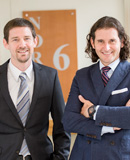
Educational Innovation Award
Health professions students often participate in international health care experiences. While these experiences are popular and can be significant for the individual trainees, they are not always designed as rigorous learning experiences nor have they been designed to have more than intermittent benefit to the communities that serve as sites. Gonzalo Bearman, M.D., M.P.H., Professor of Medicine, Epidemiology and Community Medicine and Associate Hospital Epidemiologist and Chair, Division of Infectious Disease, and Michael Stevens, M.D., M.P.H., Assistant Professor of Medicine, Infectious Disease, and an Associate Hospital Epidemiologist have addressed both of these weaknesses through their innovative work in the VCU Global Health and Health Disparities Program (GH2DP).
GH2DP, created in 2008 to improve the health of people living in resource-poor locations, provides learners access to quality global health experiences and provides public health research opportunities. Drs. Bearman and Stevens are dedicated to making this an engaging service experience and a meaningful learning experience. GH2DP has worked primarily with “La Hicaca,” an area of approximately 2,000 people in 17 villages in a remote, mountainous area of Northern Honduras. 63 VCU medical students, over 40 medicine and pediatrics residents, 8 pharmacy students and multiple VCU engineering and public health students have participated in the program.
In a full-year commitment, participants must take the Service Learning Elective and study population health, public health practice, and effective clinical care in limited-resource settings. Physical exam skills are taught in a context of culturally-sensitive care. Essays written before and after the experience and presentations to peers promote self-reflection and personal growth. Thirty-two learners have been involved in research projects exploring ways to benefit resource-poor communities. Ten papers, seventeen presentations at local and national conferences, thirteen presentations at national conferences, and two presentations at international conferences have resulted from GH2DP research projects.
In 2012 a formal two-year track was established in the Internal Medicine Training Program offering advanced training and experience in global health. The GH2DP residency pathway requires design and implementation of an original research project, submission of the results for presentation at a national conference and submission of at least one manuscript for publication. A robust academic program includes graduate and on-line coursework at VCU and a journal club. Two international rotations and sixty hours of service for disadvantaged patients in the Richmond area are required.
The GD2HP Student Scholars program, created in 2013, formally mentors four Student Scholars who are working on projects on areas including water catchment (funded by a VCU Quest Innovation Grant), women’s health, and soil-transmitted parasites.
Medical student Jaclyn Arquiette states, “They have been more than teachers to me and have pushed me to further myself as a researcher and to incorporate research into my future career as a physician. In allowing me to take the lead in carrying out my research in Honduras, analyzing the data, preparing poster and oral presentations, and even in writing an original manuscript, they have supplied me with a skill set that I could not have obtained otherwise.”
“Through GD2HP, they teach learners how to identify the needs of the community, search the literature, select and implement methods of intervention, collect outcome data, and summarize and present the findings,” Jeffrey S. Wang, M.D., an Infectious Disease Fellow at UC-Irvine and a recent graduate from the Internal Medicine residency program recalls, “Through their mentorship an impressive body of research has arisen.”
The impact on La Hicaca is significant. Rev. Pedro José Hernández O’Hagan, SdJ, Saint George’s Catholic Parish Vicar, Olanchito, Yoro, Honduras, praises Dr. Bearman and Stevens, saying, “I can state without doubt that the work that (they) have done has definitely increased the population’s health and dignity of life … I very much appreciate Drs. Bearman and Stevens for their efforts in conveying a wider view of the world’s need for truly dedicated doctors, always in a quest for excellence.”